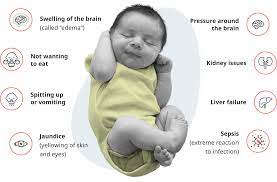 Galactosemia meaning is a rare genetic metabolic disorder that affects an individual’s ability to metabolize the sugar galactose properly.
Galactosemia meaning is a rare genetic metabolic disorder that affects an individual’s ability to metabolize the sugar galactose properly.
Galactosemia follows an autosomal recessive mode of inheritance that confers a deficiency in an enzyme responsible for adequate galactose degradation.
Its incidence is about 1 per 60,000 births for people of European ancestry.
Galactosaemia is about one hundred times more common (1:480 births) in the Irish Traveller population.
Infants may appear asymptomatic at birth.
Within ingestion of galactose a few days later by breast and/or formula feeding, children start to experience life-threatening symptoms, which include:
poor feeding, and weight gain
vomiting and diarrhea
hepatocellular damage
lethargy, and hypotonia
Progression of this acute neonatal toxicity syndrome may include the development of sepsis, cataracts, and even pseudotumor cerebri.
In children, untreated galactosemia can lead to cataracts, developmental delays, intellectual disabilities, speech difficulties, fine and gross motor difficulties, kidney disease, liver failure, sepsis, and premature ovarian insufficiency.
Lactose in food is broken down by the enzyme lactase into glucose and galactose.
In individuals with galactosemia, the enzymes needed for further metabolism of galactose are severely diminished or missing entirely.
In this setting there are toxic levels of galactose or galactose 1-phosphate in various tissues, resulting in hepatomegaly, cirrhosis, kidney failure, cataracts, vomiting, seizure, hypoglycemia, lethargy, brain damage, and ovarian failure.
Without treatment, mortality in infants with galactosemia is about 75%.
Galactosemia is inherited in an autosomal recessive manner.
Heterozygotes are carriers, because they inherit one normal gene and one defective gene, show no symptoms of galactosemia.
In galactosemic patients, the accumulation of galactose becomes the substrate for enzymes that catalyze the polyol pathway of carbohydrate metabolism.
Aldose reductase reduces galactose to its sugar alcohol form, galactitol, which accumulates in body tissues and is excreted in the urine of galactosemic patients.
Accumulation of galactitol has been attributed to many of the negative effects of galactosemia.
In many countries throughout the world, infants routinely undergo newborn screening (NBS) for galactosemia.
Infants affected by galactosemia typically present with symptoms of lethargy, vomiting, diarrhea, failure to thrive, and jaundice.
If the family of the baby has a history of galactosemia, it can be tested prior to birth by amniocentesis or chorionic villus sampling.
Galactosemia is normally first detected through newborn screening which is able to diagnose the majority of affected infants.
A galactosemia blood test or urine test that checks for three enzymes that are needed to change galactose sugar that is found in milk and milk products into glucose, a sugar that the human body uses for energy.
Affected children can have serious, irreversible effects or even die within days from birth.
It is important that newborns be screened for metabolic disorders without delay.
Two screening tests are used to screen infants affected with galactosemia-the Beutler’s test and the Hill test.
The Beutler’s test screens for galactosemia by detecting the level of enzyme of the infant.
Therefore, the ingestion of formula or breast milk does not affect the outcome of this part of the newborn screening, and the NBS is accurate for detecting galactosemia prior to any ingestion of galactose.
Duarte galactosemia is a milder form of classical galactosemia and usually has no long term side effects.
Galactose is converted into glucose by the action of three enzymes, known as the Leloir pathway.
There are diseases associated with deficiencies of each of these three enzymes:
TREATMENT:
The only treatment for classic galactosemia is eliminating lactose and galactose from the diet, that is the exclusion of dairy products containing lactose.
Lactose restricted diet is efficient in resolving acute complications, however, it is not sufficient to prevent long-term complications affecting the brain and female gonads.
Long-term complications include: speech difficulties, learning disabilities, neurological impairment and ovarian failure.
Symptoms that have not been associated with Duarte galactosemia.
Galactosemia is a more serious condition than lactose intolerance.
Galactosemic individual who consumes galactose can have serious complications including:
Speech deficits
Ataxia
Dysmetria
Diminished bone density
Premature ovarian failure
Cataracts
